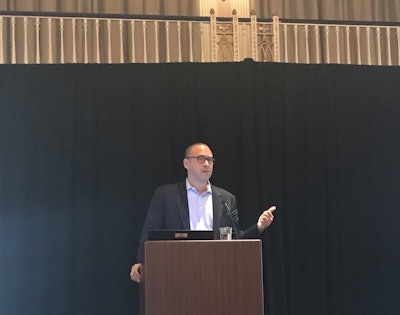CHICAGO — Northwestern University’s provost, Dr. Jonathan Holloway, knows first-hand how difficult it can be to navigate free speech issues on campus.
A prominent historian and the first Black dean of Yale College recalled how in 2015, the Ivy League school became a “nerve center” and captured national headlines when racial protests erupted on campus and he was criticized by Black students for taking too long to respond.
Angry students surrounded him on campus one November day and buttonholed him on what he was going to do to change the climate on campus.
Ironically, during that very same semester, Holloway was teaching a post-Emancipation course and that very week was lecturing to students about Black student radicalism in the 1960s.
 Dr. Jonathan Holloway delivers talk on free speech at Council of Graduate Schools Summer Workshop & New Deans Institute
Dr. Jonathan Holloway delivers talk on free speech at Council of Graduate Schools Summer Workshop & New Deans Institute“So, Professor Holloway being surrounded by 250 students is thinking, ‘Wow, this is pretty cool,’” Holloway told a group of graduate school deans who traveled to Chicago for the Council of Graduate Schools Summer Workshop and New Deans Institute. “Dean Holloway wanted it to stop very quickly.”
In the opening plenary titled, “Whose Speech is Free? Diversity, Inclusion and the Politics of Expediency,” Holloway shared his experience and warned administrators not to shy away from discussing free speech issues on campus.
“We need to be unafraid to talk and listen and have really difficult conversations,” he said, adding that the purpose of the university is to debate ideas — even ideas that one disagrees with.
At Yale, like across the nation, there have been calls by some to ban controversial speakers.
“I don’t mind people with difficult, painful and even ugly ideas being able to speak on campus,” said Holloway. “But please make sure the speakers come with ideas and not just mere provocation. If we aren’t above that, we aren’t really educating people. It’s simply a parlor game.”
An institution’s racial past, said Holloway, should be confronted, examined and discussed openly.
“We can’t be afraid to look at our past,” he told the more than 200 college administrators. “It tells us who we are. Colleges and universities must reckon with our American history and be prepared to make value judgments. Administrators must be willing to talk about things we value, including free expression.”
Holloway said colleges and universities are increasingly becoming targets for “people who want to take political potshots,” and that universities should be more aggressive in defending their existence and “to educate, think critically, bring new ideas, and have a passionate commitment to a better world.”
During the four-day CGS convening, which concludes Wednesday, topics range from graduate student health and linking financial support to student outcomes and supporting international student enrollment.
The Education Testing Service sponsored a breakfast titled “Diversity in Graduate Education: Looking At, and Beyond, Admissions.”
Dr. Suzanne T. Ortega, President of CGS, said the purpose of the gathering is to improve and advance graduate education.
“CGS does not shy away from the thorny issues, the ones with no easy answers,” said Ortega, whose organization represents about 500 institutions. “One of the great challenges that I think for graduate deans and other staff working to support graduate education is that we work in an environment where our political, economic and social landscape seems to change by the minute. And in this environment where there is enormous pressure for us to respond quickly, but to do so thoughtfully with discipline, creates a real pressure point that makes it difficult for us to remember what we all always have in the end is a singular commitment to keep our students centered, first and foremost.”
Jamal Watson can be reached at [email protected]. You can follow him on Twitter @jamalericwatson
















